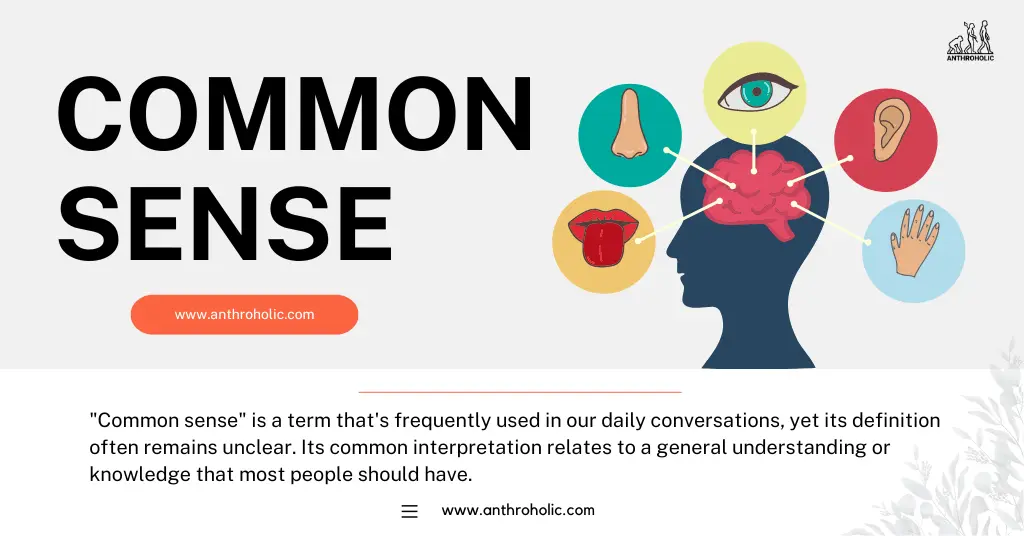AI Answer Evaluation Platform Live Now. Try Free Answer Evaluation Now
Common Sense
“Common sense” is a term that’s frequently used in our daily conversations, yet its definition often remains unclear. Its common interpretation relates to a general understanding or knowledge that most people should have. But is it really that simple? Let’s delve into the complexity of common sense.

Defining “Common Sense”
Common sense, as defined by the Merriam-Webster Dictionary, is “sound and prudent judgment based on a simple perception of the situation or facts.” Essentially, it refers to the innate ability to make sensible decisions without needing specialized knowledge.
Components of Common Sense
To truly understand common sense, it is essential to recognize its components. Here are the key elements:
- Perception: The ability to notice or understand something through the senses.
- Judgment: Making a decision or forming an opinion after careful thought.
- Prudence: The quality of being wise in practical affairs, foresight.
These three components come together to form what we colloquially refer to as “common sense”.
Common Sense vs. Intelligence
Though commonly confused, common sense and intelligence are not the same. A table below elucidates the differences:
| Common Sense | Intelligence | |
|---|---|---|
| Definition | An innate ability to make practical decisions | A capacity for learning, understanding, and applying knowledge |
| Measurement | Subjective, usually judged by daily life decisions | Often measured by IQ or other standardized tests |
| Scope | Relates to practical knowledge and day-to-day situations | Encompasses a wide range of abilities, including creativity, problem-solving, and academic knowledge |
Is Common Sense Universal?
Contrary to its name, common sense is not as “common” as one might think. A variety of factors, such as cultural background, personal experiences, and social context, can greatly influence one’s perception of common sense. What seems like a common sense decision in one culture may be perceived differently in another. This cultural relativity of common sense makes it an interesting field of study for sociologists and anthropologists.
The Role of Common Sense in Decision-Making
Common sense plays a significant role in decision-making. It:
- Aids in swift decision-making during everyday situations.
- Helps prevent unnecessary complications.
- Encourages practical and prudent actions.
However, relying solely on common sense may not always be beneficial, particularly when dealing with complex or unfamiliar situations. It is at these times when specialized knowledge and critical thinking skills become crucial.
Cultivating Common Sense
Though often considered inherent, common sense can indeed be nurtured and developed. Here are some tips to enhance your common sense:
- Stay Informed: Understand the world around you. Being aware of current events and social norms can greatly improve your common sense.
- Learn from Experience: Reflect on past experiences, both your own and others’. Understanding what went well and what didn’t can guide future actions.
- Develop Empathy: Understanding others’ perspectives can help in making sound, fair, and considerate decisions.
- Think Practically: Over-complication often leads to impractical solutions. Stick to simplicity when possible.
Common Sense and Anthropology: A Nexus of Understanding
Anthropology, the study of human societies and cultures, frequently intersects with the concept of “common sense”. Understanding the relationship between these two can offer significant insights into how cultures perceive and navigate their world.
The Role of Common Sense in Anthropology
In the realm of anthropology, common sense is often viewed as the shared understanding and basic knowledge that govern a particular culture or society. It plays a crucial role in various aspects:
- Cultural Norms and Practices: Common sense informs the accepted practices within a culture, shaping behavioral norms and social interactions.
- Understanding Societies: Anthropologists often rely on the common sense of a society to understand its underlying values and beliefs.
- Cultural Relativity: Common sense isn’t universal. What’s considered common sense in one culture might not be the same in another, emphasizing the importance of cultural relativity in anthropology.
The Influence of Culture on Common Sense
The reciprocal relationship between culture and common sense is a focal point in anthropology. Common sense is both shaped by and shapes the cultural context in which it operates. Here are some examples:
- Behavioral Norms: Culture-specific common sense influences what is considered acceptable or unacceptable behavior within a particular society.
- Decision Making: The common sense of a culture can greatly impact the decision-making process, including what is perceived as a ‘good’ or ‘bad’ decision.
- Conflict Resolution: Culture-specific common sense also informs how conflicts are resolved within a society, including whether direct confrontation or more indirect methods are favored.
Using Anthropology to Cultivate Common Sense
Anthropology’s study of different cultures and societies can significantly enhance our understanding and application of common sense. By exploring diverse cultural perspectives, we can:
- Broaden Understanding: Anthropological studies can help individuals appreciate the cultural relativity of common sense, and broaden their understanding beyond their own cultural lens.
- Improve Intercultural Communication: Understanding the common sense of different cultures can enhance communication, cooperation, and empathy in intercultural contexts.
- Foster Inclusivity: Recognizing the diversity of common sense across cultures can promote inclusivity and respect for cultural differences.
Conclusion
Common sense, although vaguely defined and culturally relative, plays an essential role in our daily lives. It allows us to make quick, practical decisions that keep our lives running smoothly. But it’s important to remember that common sense is not a substitute for specialized knowledge and critical thinking. Balance is key.
References
- Merriam-Webster. (n.d.). Definition of COMMON SENSE. In Merriam-Webster.com dictionary. Retrieved July 18, 2023, from https://www.merriam-webster.com/dictionary/common%20sense
- Sternberg, R. J., & Sternberg, K. (2016). Cognitive Psychology. Boston, MA: Cengage Learning.
- Nisbett, R. E. (2003). The Geography of Thought. New York, NY: Free Press.



